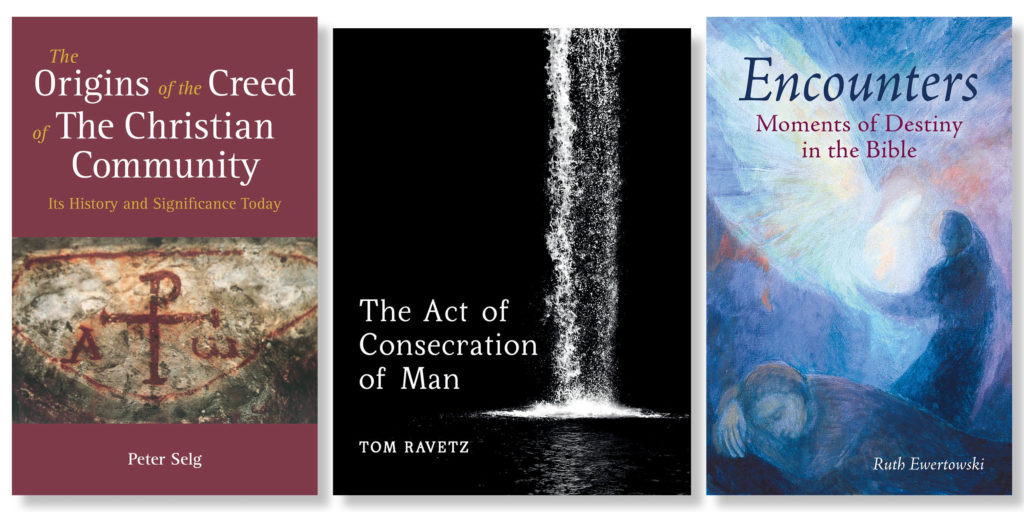The Spirit of Community: The Power of the Sacraments in The Christian Community by Ulrich Meier
by Floris Books • 22 April 2024 • Extract, Philosophy of Human Life, Religion, Steiner Waldorf Education, The Christian Community, The Christian Community • 0 Comments

Modern society places great emphasis on the individual as a dynamic, creative force, free to pursue their own goals and ambitions. Despite this, some people still long to be part of a community and form meaningful relationships with other human beings. One of the places this deeper connection can be found is in common worship.
In The Spirit of Community Ulrich Meier, an experienced priest, exhibits how each of the seven sacraments of The Christian Community contributes to community building. Through baptism, we welcome new life on earth; confirmation marks the transition from the close ties of parent to the wider community; and in sacramental consultation, individuals explore the relationship of their past actions to their future intentions.
The Spirit of Community is for anyone who wishes to deepen their understanding of the sacraments, and help to build a more vibrant church community. Get a glimpse of Ulrich Meier’s insights into the relationship between the individual and community in the extract below.
Community and the Individual
Whenever an individual considers joining a community, the first question that usually preoccupies them is what will they gain from becoming a member and what will membership demand of them? They might wonder which of their desires will be fulfilled by participating in the group, and what, by contrast, they might have to surrender in order to belong to it. How will the expected friction between self and group impact their life? Is there likely to be a danger that they will have to suppress and adapt themselves to such a degree that they can no longer experience their essential nature? Or will they end up asserting themselves so strongly that conflict with other members of the group will soon develop? These issues ultimately lead to the question of whether the individual serves the community or the community serves the individual.
In Jesus’ dispute with the Pharisees about picking heads of grain on the Sabbath, the answer to this question is clearly apparent in relation to religious law: ‘Then he said to them, “The Sabbath was made for man, not man for the Sabbath”’ (Mark 2:27). This does not however imply that the fundamental tension between individual and community has been resolved.
On December 12, 1918, shortly after the end of the First World War, Rudolf Steiner gave a lecture on the life of society in which he spoke about both the social and antisocial impulses of the human soul and spirit. He saw these as an oscillation between two extremes, neither of which could fully develop without the other. The idea of ‘social requirements’, much discussed at the time, was justified on the grounds that the individual’s need for self-assertion and self-isolation required balancing with social structures. In the reality of social interplay, therefore, ‘I’ and ‘we’ should not be seen as fixed entities in conflict with one another, but as part of a process of breathing. The mature I then no longer sees itself in tension between adaptation and opposition, but seeks out periods of loneliness for itself in order to become free again for life in community. In 1937, Dietrich Bonhoeffer summed this up in his book Life Together: ‘Whoever cannot be alone should beware community. Whoever is not part of a community, should beware being alone.’
This points to the needs of both the individual and the community, conditions which, arising from a seemingly static opposition between ‘I’ and ‘we’, can lead to fruitful reciprocity. Here the I does not experience community either as a threat to its self-realisation or as a substitute for it. And the community so organises itself that, rather than seeing its parts and members as contradicting the good of the whole, it views them instead as the potential for its enrichment and fulfilment.
About the Author
Ulrich Meier was born in Hamburg in 1960. He studied at the seminary in Stuttgart and was ordained as a priest of The Christian Community in 1990. After working in a congregation, Meier took over the management of the seminary in Hamburg in 2006. He is also the editor of Die Christengemeinschaft, the journal of The Christian Community, and author of a number of books on aspects of the sacraments and on ethics.
You may also be interested in…

Sign up to our mailing list to receive the latest news and discounts on books on Christian Spirituality.